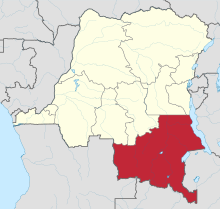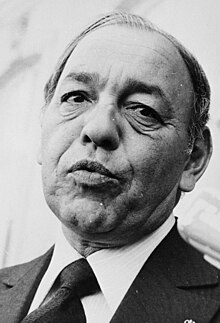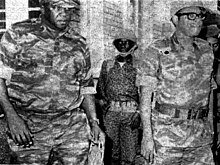Shaba I
The FNLC made quick progress through the region because of the sympathizing locals and the disorganization of the Zairian military (Forces Armées Zaïroises, or FAZ).
Zairian President Mobutu Sese Seko accused Angola, East Germany,[6] Cuba and the Soviet Union of sponsoring the rebels.
[13] US President Jimmy Carter approved the shipment of supplies to Zaire but refused to send weapons or troops and maintained that there was no evidence of Cuban involvement.
However, Mobutu won a public relations victory and ensured continuing economic assistance from governments, the International Monetary Fund, the World Bank and a group of private lenders led by Citibank.
Franco-Zairian relations were improving, and the Zaire government had recently been snubbing Belgium for France by awarding the country a $500 million telecommunications contract in 1975.
[22] When Joseph Kasa-Vubu recalled the Katanganese leader Moise Tshombe from exile in 1964, elements of the force had been incorporated into the Armee Nationale Congolaise (ANC) to help fight the insurrections simmering throughout the country.
The announcements were later traced to the Central Intelligence Agency (CIA)[43][44] Belgium sent weapons to the Zaire government[45] but declined Mobutu's request for military assistance.
[4][5] Cuban President Fidel Castro denied that Cuba was involved in the conflict and called Mobutu "desperate" and the accusation being "a pretext to get military assistance from imperialism so he can continue to oppress the people of Zaire".
[51] A group of 98 banks, led by Citibank, had agreed in November 1976 to offer Zaire a $250 million loan if the country promised to implement economic austerity.
[61] The perception of the rebels' power increased as reports suggested they were beginning to provide social assistance to local people in the Shaba province.
[9] According to later reports from missionaries in the area, the rebels, whose primary agenda was freedom from Mobutu, not ethnic or tribal warfare, were welcomed by locals in Katanga.
[66] Along with other residents, 28 missionaries from Britain, Australia, Canada, New Zealand, France, Belgium, Italy and Spain fled from the bombing raids, eventually taking refuge in Angola.
[71] On a diplomatic visit to Washington, DC, Egyptian President Anwar Sadat emphasised that claim to Carter, who maintained throughout the conflict that there was no evidence of outside involvement.
[74] Mobutu reproached the United States in a Newsweek interview and said that he was "bitterly disappointed by America's attitude"[75] and "If you have decided to surrender piecemeal to the Soviet-Cuban grand design in Africa, I think you owe it to us and to your friends to have the frankness to admit it.
[94] The operation was co-ordinated by a covert multinational organization, the Safari Club, an anticommunist alliance including France, Morocco, Egypt, Iran and Saudi Arabia.
[12] France also assisted the FAZ with additional Mirage planes, Panhard Véhicule Blindé Légers and Aérospatiale SA 330 Puma helicopters.
[98] After Western military support had arrived in Kolwezi, Zambia said that Zaire had bombed the village of Shingamjunji Mangango and the Kaleni Hill mission hospital.
[3] Morocco provided 1,300 to 1,500 combat troops, Egypt contributed pilots and technical support and Saudi Arabia backed the operation financially.
[3] Moroccan troops increased the perception that the operation was internal to Africa,[98] with Zaire originally announcing that Morocco and "another African country" were coming to its assistance.
Idi Amin and a symbolic "suicide striking force" of the Ugandan military visited Kolwezi in late April and then flew back to Uganda.
A representative of the Katanganese rebels, speaking in Paris, criticised the intervention as economically self-serving: "the stake of French multinationals such as Alsthom and Thomson, and concessions for prospecting the mineral riches" had led France to support "a corrupt regime".
The FLNC calls on the French people, to whom it expresses its trust and friendly feelings, to demand the immediate termination of the aggression deliberately carried out against the Congolese people.Angola declared the invaders "responsible for the grave consequences that may result from their intervention in the conflict" and warned that "if the objective is to attack Angola, the Popular Republic of Angola warns Africa and the world that it will not tolerate any foreign intervention".
[126] The government displayed the two captives in another stadium rally in which Mobutu again condemned Soviet and Cuban involvement and ordered $60,000 worth of Coca-Cola to go along with rations for FAZ soldiers.
[131][132] Mobutu held a press conference and parade in Mutshatsha, telling 47 international journalists that he would continue to battle Soviet influence in Africa.
Mobutu's patchwork army of reluctant unemployed urban youths, displaced farmers' sons, the restless Moroccans and the Pygmies face an estimated 100 battle groups, each consisting of 30 well trained and well armed men operating deep inside friendly trail areas.
[146] The European, Australian and Canadian missionaries who surfaced after fleeing to Angola said that locals supported the rebels, none of whom being Cuban or Angolan, because they opposed Mobutu.
[154] As the FAZ, with France, Morocco, Egypt and Belgium, drove the rebels out of Zaire, the Ethio-Somali Ogaden War created another international crisis involving the United States, the Safari Club, Cuba and the Soviet Union.
Van Melle was a key contact for European and American intelligence agencies, and his dismissal made reliable information even harder for them to find.
[22] Zaire's allies provided a large influx of military equipment, and Belgian, French and American advisers assisted in rebuilding and retraining the force.
[22] Shaba I was a major public relations victory for Mobutu by securing his regime and winning continued military and economic assistance from the Western Bloc.











